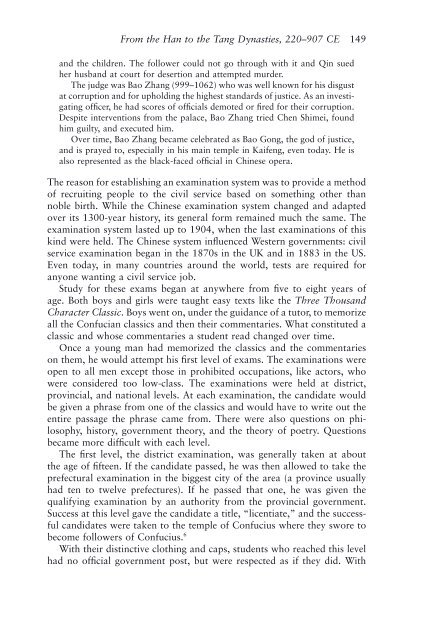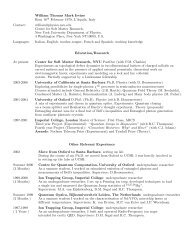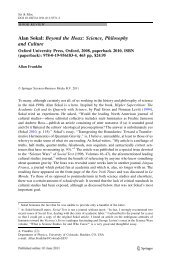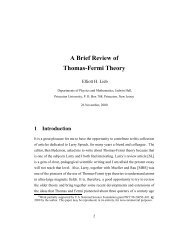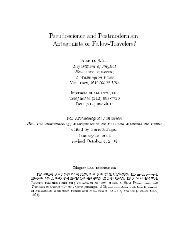Good Confucianism book (pdf) - Department of Physics
Good Confucianism book (pdf) - Department of Physics
Good Confucianism book (pdf) - Department of Physics
You also want an ePaper? Increase the reach of your titles
YUMPU automatically turns print PDFs into web optimized ePapers that Google loves.
From the Han to the Tang Dynasties, 220–907 CE 149and the children. The follower could not go through with it and Qin suedher husband at court for desertion and attempted murder.The judge was Bao Zhang (999 – 1062) who was well known for his disgustat corruption and for upholding the highest standards <strong>of</strong> justice. As an investigating<strong>of</strong>ficer, he had scores <strong>of</strong> <strong>of</strong>ficials demoted or fired for their corruption.Despite interventions from the palace, Bao Zhang tried Chen Shimei, foundhim guilty, and executed him.Over time, Bao Zhang became celebrated as Bao Gong, the god <strong>of</strong> justice,and is prayed to, especially in his main temple in Kaifeng, even today. He isalso represented as the black - faced <strong>of</strong>ficial in Chinese opera.The reason for establishing an examination system was to provide a method<strong>of</strong> recruiting people to the civil service based on something other thannoble birth. While the Chinese examination system changed and adaptedover its 1300 - year history, its general form remained much the same. Theexamination system lasted up to 1904, when the last examinations <strong>of</strong> thiskind were held. The Chinese system influenced Western governments: civilservice examination began in the 1870s in the UK and in 1883 in the US.Even today, in many countries around the world, tests are required foranyone wanting a civil service job.Study for these exams began at anywhere from five to eight years <strong>of</strong>age. Both boys and girls were taught easy texts like the Three ThousandCharacter Classic . Boys went on, under the guidance <strong>of</strong> a tutor, to memorizeall the Confucian classics and then their commentaries. What constituted aclassic and whose commentaries a student read changed over time.Once a young man had memorized the classics and the commentarieson them, he would attempt his first level <strong>of</strong> exams. The examinations wereopen to all men except those in prohibited occupations, like actors, whowere considered too low - class. The examinations were held at district,provincial, and national levels. At each examination, the candidate wouldbe given a phrase from one <strong>of</strong> the classics and would have to write out theentire passage the phrase came from. There were also questions on philosophy,history, government theory, and the theory <strong>of</strong> poetry. Questionsbecame more difficult with each level.The first level, the district examination, was generally taken at aboutthe age <strong>of</strong> fifteen. If the candidate passed, he was then allowed to take theprefectural examination in the biggest city <strong>of</strong> the area (a province usuallyhad ten to twelve prefectures). If he passed that one, he was given thequalifying examination by an authority from the provincial government.Success at this level gave the candidate a title, “ licentiate, ” and the successfulcandidates were taken to the temple <strong>of</strong> Confucius where they swore tobecome followers <strong>of</strong> Confucius. 6With their distinctive clothing and caps, students who reached this levelhad no <strong>of</strong>ficial government post, but were respected as if they did. With


